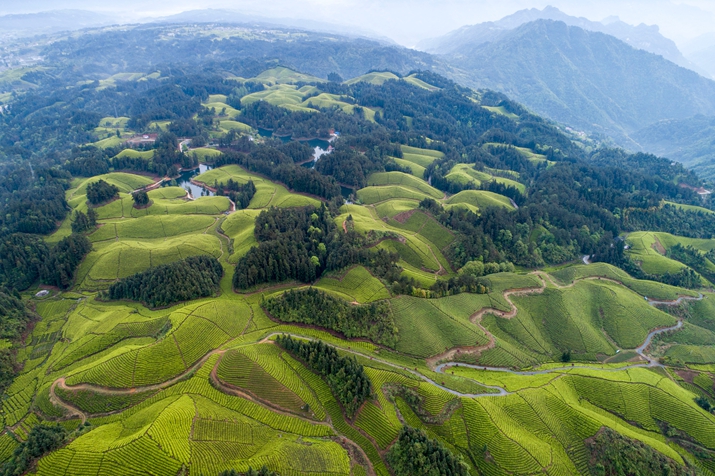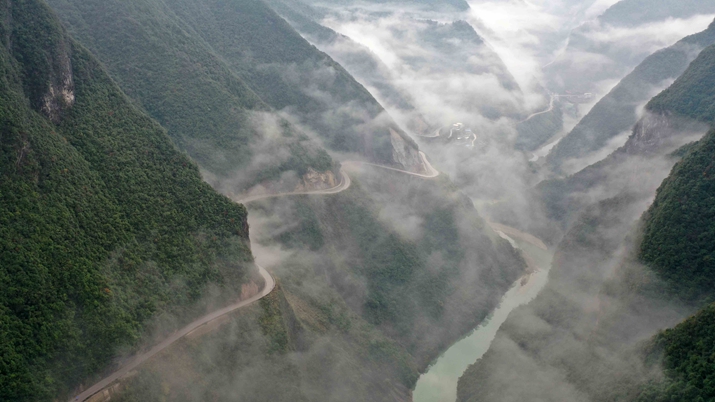|
||||||||||
| Home Nation World Business Opinion Lifestyle ChinAfrica Multimedia Columnists Documents Special Reports |
|
||||||||||
| Home Nation World Business Opinion Lifestyle ChinAfrica Multimedia Columnists Documents Special Reports |
| ChinAfrica |
| Mountain-locked county in Hubei Province prospers from tea plantation |
| During each harvesting season, the tea leaves can be picked five times, yielding around 500 kg of fresh tea leaves per mu. The income from tea planting for a household averages at 5,000 yuan ($764.5) each season |
| By Hu Fan VOL. 13 MAY 2021 ·2021-05-17 |

A tea farm in Hefeng County on April 24, 2020 (CNSPHOTO)
Zhong Cheng had some of his busiest days of the year in early April, when he needed to handpick the first batch of fresh tea leaves of the spring. These leaves, picked before the Qingming Festival, one of China's most important traditional festivals, are the season's best and fetch the best price.
Aged 44, Zhong is a villager in Hefeng County located in the mountains of Enshi Tujia and Miao Autonomous Prefecture of Hubei Province in central China. In the villages of the province, men of his age usually migrate to cities for better income. But in Hefeng, tea plantation provides a way for the villagers to live where they were born.
During each harvesting season, the tea leaves can be picked five times, yielding around 500 kg of fresh tea leaves per mu. The income from tea planting for a household averages at 5,000 yuan ($764.5) each season.
Out of the county's total population of 220,000, 140,000 people are engaged in the tea industry. Thanks largely to the industry, the county stepped out of poverty in April 2019 in China's poverty alleviation campaign.

Tourists in a valley in Hefeng County on November 13, 2020 (CNSPHOTO)
Pillar industry
Locked by the Wuling Mountains, the county has been plagued by transportation difficulties.
It is not linked to any railway network and the first highway connecting it to the outside world was put into operation just last year. However, the county is endowed with an optimal natural environment.
Stretching across the 30 degrees north latitude, the county has an ideal climate for growing tea. The soil here is rich in selenium, a healthy ingredient. Tea products from the county feature special fragrance and fresh taste.
Tea plantation in the country dates back to ancient times, when it was a source of tea for the Tea Road that transported Chinese tea to Russia and then other parts of the world. Today, 90 percent of the villages and 70 percent of the rural households are engaged in tea plantation, which accounts for over 50 percent of their income.
Apart from planting, many households also engaged in the business of primary processing of the leaves. They set small processing plants so that freshly harvested tea leaves are immediately processed. This shortens time-to-market for the finished product and helps retain their freshness.
By the end of 2020, the county has planted close to 400,000 mu of tea, with an annual production of 37,000 tons and an output value of 1.5 billion yuan ($229 million). The county exported $22 million worth of tea in the year.
Africa is one of the export markets for the tea produced in the county. Qingcuiyuan, a local tea company, has started a venture in Morocco to process tea locally. In 2013, Liu Yu, General Manager of the company, paid a visit to the African country with a delegation organized by Hubei Province's trade promotion department. He found that Chinese tea was popular in the country, but most of the tea sold in the market was in the form of finished products imported from China.
Starting with a small workshop in the harbor city of Casablanca, they now run a plant in an industrial park with 14 production lines. With an annual sales volume of $6 million, the plant has not only promoted exports of tea from Hefeng, but also provided around 80 local jobs in Morocco.

A hillside road in Hefeng County on November 18, 2020 (XINHUA)
Aiming higher
Promoting the tea industry has been a focus of the local government. One of its major current efforts is to become China's top county for organic tea, which is grown without the use of chemical pesticides or fertilizers, or the addition of chemicals during processing.
The county started the plantation of organic tea in 2013 on a trial basis, and decided to expand the initiative in 2017. The local government provided financial support to build new organic farms or upgrade existing farms into organic ones.
At the beginning, the villagers were not very receptive to the idea, but after seeing that the income from organic tea was higher due to higher prices, more villagers joined in. By the end of 2020, around 100,000 mu of tea farms in the county have been recognized as organic farms following stringent standards.
Apart from chemical pesticides and fertilizers, other sources of contamination such as single-use plastics and fireworks are also banned from the farms. This has helped maintain a clean and beautiful environment, which is another important advantage of the county.
On October 16, 2020, Hefeng was certified as China's first demonstration county for countywide organic tea plantation by experts from the China Association for the Promotion of International Agricultural Cooperation and other organizations of the tea industry at a trading fair held in the county.
"Our next target is to expand our organic farms to over 150,000 mu in the following five years," said Tian Zhiren, Director of the county's tea industry promotion center established in 2019.
Another focus of the county is to elevate the visibility of the local varieties of tea. Tian told ChinAfrica that though the county has around 1,000 processing plants, few of them are strong enough to own or promote brands.
One approach the county is adopting is to integrate the tea industry with tourism. The county has rich natural tourist resources thanks to its karst landforms. It is a habitat of the Miao and Tujia ethnic groups with unique cultural traditions such as dancing and singing. Tea farms also constitute an important component of the county's tourist resources. Its Mu'er Hill was designated as one of China's 30 most beautiful tea farms at the Second China Tea Industry Conference in 2015.
These natural resources were locked by the mountains and not accessible in the past, but with the improvement of transportation, especially the opening of the highway in 2020, the development mode of combining the tea industry and tourism will bring much more benefit to local people. Tian is fully confident of that.
(Print Edition Title: Flourishing Gardens)
Comments to Hufan@chinafrica.cn
| About Us | Contact Us | Advertise with Us | Subscribe |
| Copyright Beijing Review All rights reserved 京ICP备08005356号-5 京公网安备110102005860号 |